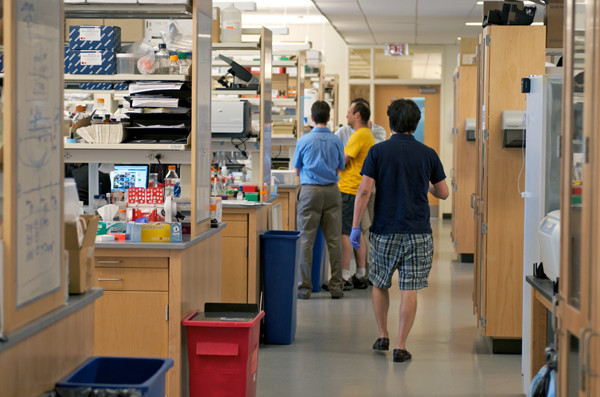Working as an alliance among Harvard’s Schools of Medicine, Engineering, and Arts & Sciences, and in partnership with Beth Israel Deaconess Medical Center, Boston Children’s Hospital, Brigham and Women’s Hospital, Dana Farber Cancer Institute, Massachusetts General Hospital, the University of Massachusetts Medical School, Spaulding Rehabilitation Hospital, Tufts University, and Boston University, the Institute crosses disciplinary and institutional barriers to engage in high-risk research that leads to transformative technological breakthroughs.
By emulating Nature’s principles for self-organizing and self-regulating, Wyss researchers are developing innovative new engineering solutions for healthcare, energy, architecture, robotics, and manufacturing. These technologies are translated into commercial products and therapies through collaborations with clinical investigators, corporate alliances, and new start-ups.
The Wyss Institute was seeded in 2005, when the Provost of Harvard University challenged its faculty to envision the future of Bioengineering across the entire university. Typically, bioengineers apply engineering principles to solve medical problems. But we are now beginning to understand enough about how Nature builds, controls, and manufactures so that entirely new engineering principles will be discovered. These new engineering strategies will transform medicine as well as non-medical areas never before touched by the biology revolution. Recognizing that we are at a tipping point in the history of science and engineering, the faculty proposed that Harvard form a research Institute focused on discovering Nature’s design principles and on applying these insights to engineer bioinspired materials and devices.
A subset of faculty who had pioneered interdisciplinary collaborations across the Harvard community and with other universities in the Boston/Cambridge region came together to catalyze the birth of this new institute. Seed funding was provided by the university to form the Harvard Institute for Biologically Inspired Engineering in January 2008, which resulted in new cross-university collaborations in areas ranging from self-assembling scaffolds for tissue regeneration to programmable robot swarms that build structures and devices autonomously.
In January 2009, Harvard received the largest philanthropic gift in its history — $125 million — from Hansjörg Wyss to make this vision a reality by launching the Wyss Institute for Biologically Inspired Engineering. Since the gift, faculty from engineering, medicine, biology, and the physical sciences have begun to work together in entirely new ways. Unlike many bioengineering efforts, they are not looking to make incremental near-term improvements in biomedical technologies. They have been challenged to carry out high-risk research that will lead to transformative change.
The novelty of the Institute resides in its ability to break down disciplinary barriers by bringing together world-leading researchers, theoreticians, and technical staff with clinicians and industrial collaborators, creating an environment that facilitates synergy among these investigators. The Institute supports cross-cutting fundamental research that will produce completely unpredictable breakthroughs and lead to development of enabling technologies in the field of bioinspired engineering and their translation into useful products. These technologies will transform human healthcare as well as industry, manufacturing, and the environment.
Wyss Institute for Biologically Inspired Engineering
at Harvard University
Longwood address:
Center for Life Sciences Boston Bldg., 5th Floor
3 Blackfan Circle
Boston, MA 02115
Map and directions
Cambridge address:
60 Oxford St
4th Floor, Suite 403
Cambridge, MA 02138
Telephone: 617-432-7732
E-mail: [email protected]



